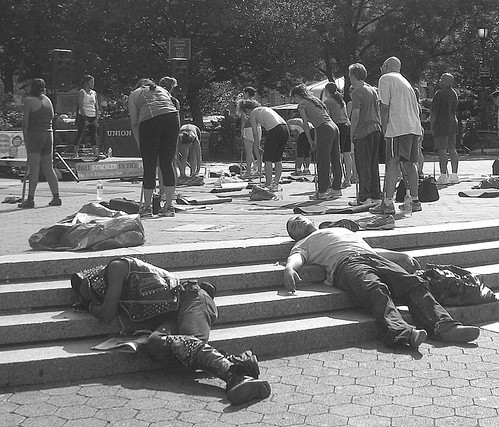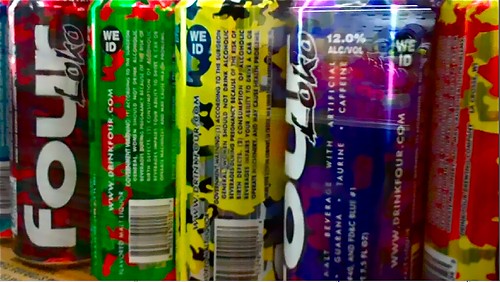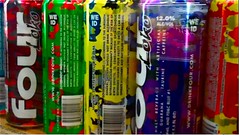 Susan Keyloun
Susan KeylounGood morning, East Village.
Here’s something to consider if you’re considering snatching up one of those rogue cans of Four Loko: Gothamist picked up a study from the Annals of Emergency Medicine that revealed 11 patients under the influence of the banned beverage (10 of them underage) were treated in the Bellevue emergency room in the four month period in late 2010. One patient had fallen onto subway tracks and five others were found unconscious in public places.
The Post’s police blotter (via EV Grieve) has news of a high speed getaway from Tompkins Square Park by a suspected drug dealer. After nearly careening into a sergeant in the stolen minivan he was driving, Robert Ball briefly escaped before hitting traffic and was apprehended.
Also from the Post, word that Jimmy McMillan, who ran for governor on a platform of “the rent is too damn high,” is facing eviction from his $872.96 rent-controlled St. Marks Place apartment. Mr. McMillan’s landlord claims he is in violation of his lease because he actually lives in Brooklyn. Mr. McMillan has vowed to fight the case. Read more…
 Chelsia Rose Marcius
Chelsia Rose MarciusOur recent posts on bodegas in the East Village that continue to sell caffeinated Four Loko struck a nerve. Many readers took time to write in and express their thoughts on our investigation, and Gothamist picked up the story and republished similar articles twice.
The action wasn’t limited to the blogosphere either: The Local’s Chelsia Rose Marcius revisited the subject after the commotion, reporting that the State Liquor Authority planned to investigate the bodegas in question.
A common label, used both in the comments section and the Gothamist posts, was “narcs” and “snitches.”
“tacony palmyra” started off the name calling:
“Well, thanks East Village Narc! I’m sure the SLA or whatever authority is going to make sure these bodegas you individually identified will be in trouble if they find any, and now we get no more old school Four Lokos. Do journalistic ethics require that you play fun police?”
Read more…
 Chelsia Rose Marcius The banned drink was on sale last week.
Chelsia Rose Marcius The banned drink was on sale last week.As we told you last week, The Local found five East Village establishments selling the caffeinated version of Four Loko, the alcoholic beverage banned last year after the New York State Liquor Authority and in-state distributors agreed to stop selling the product.
Officials with the authority said today that they plan to look into the continued sale and distribution of the beverage.
“We’ll have to investigate how this product is still on the shelves,” said William Crowley, a spokesman for the authority. “If someone is selling that stuff illegally, it’s something we’re going to look into.”
Mr. Crowley said that investigation could include examining inventory records to determine where businesses are getting the drink. He said that Four Loko is a small part of distributor inventory, and for wholesalers to continue selling the product to retailers and “take a risk like that would be surprising.”
Store owners found selling the drink face fines ranging from $1,500 to $2,000 and other penalties, including the revocation of their liquor licenses.
Steve Harris, president of the New York State Beer Wholesalers Association, said it is highly unlikely — but not impossible — that retailers are getting the drink from New York distributors who are not a part of the association.
He noted that area businesses could also be “getting it illegally from New Jersey wholesalers or retailers,” or other out-of-state distributors.
“I can tell you unequivocally that none of my members sell the stimulant stuff anymore,” said Mr. Harris, whose group is made up of 44 distributors. “But there is another group of wholesalers that could still have it.”
 Chelsia Rose Marcius An image of a store shelf at the Houston Village Farm on the corner of First Avenue and Fourth Street featuring the banned version of the caffeinated alcoholic beverage Four Loko.
Chelsia Rose Marcius An image of a store shelf at the Houston Village Farm on the corner of First Avenue and Fourth Street featuring the banned version of the caffeinated alcoholic beverage Four Loko.Along the left-side wall of a bodega on Avenue B stands a row of glass door refrigerators, stocked with an assortment of alcoholic beverages from bottles of Budweiser to cans of Coors Light.
Three shelves down in the first fridge, there’s also another beer-like brew — Four Loko, the caffeinated alcoholic beverage that created a buzz before it was banned last year in several states, including New York.
The manager of this minimart — who spoke only on the condition of anonymity for fear of losing his job — said he knows it’s “illegal” to sell this version of the drink, an alcohol and caffeine combo that was manufactured by Phusion Projects last year before the company reformulated the product to eliminate caffeine. Yet more than seven months after the December 2010 ban took effect, several East Village establishments continue to sell the old Four Loko, a top selling brand name that brings some small businesses big bucks.
The Local visited 39 East Village establishments along Broadway, Third Avenue, Second Avenue, First Avenue, Avenue A, Avenue B, Avenue C and Avenue D. Of these, 26 sold the new, non-caffeinated Four Loko.
However, five stores — Le Basket, 683 Broadway; Houston Village Farm, 61 First Avenue; 1st Ave Village Farm & Grocery, 113 First Avenue; Village Magazine, Cigar & Gourmet Food, 102 Second Avenue; and 21 Produce Corp., 21 Avenue B. — were still selling the banned product, as of Thursday.
Read more…
It’s the final day to buy Four Loko.
After today, it will be illegal for any retailer to sell the alcoholic energy drink in New York, and other states are following suit.
In the final week of Four Loko sales, fans of the beverage have been emptying their wallets to stock up and clearing East Village bodegas of their supplies in the process. Beer distributors and the Chicago-based Four Loko manufacturer, Phusion Projects, were asked to stop restocking the product as of Nov. 19. Retailers who fail to unload the product by today will have to pay a fine.
Why all the fuss? One 24-ounce can of Four Loko contains approximately the same amount of alcohol as five beers, plus the caffeine content of three cups of coffee. In the East Village, most cans, which boast 12 percent alcohol by volume, were selling for $3 or $4.
NYU Journalism’s Claire Glass reports.






